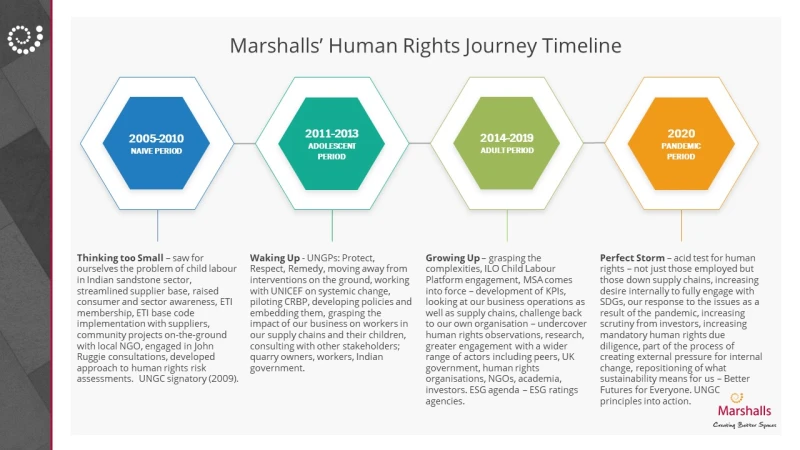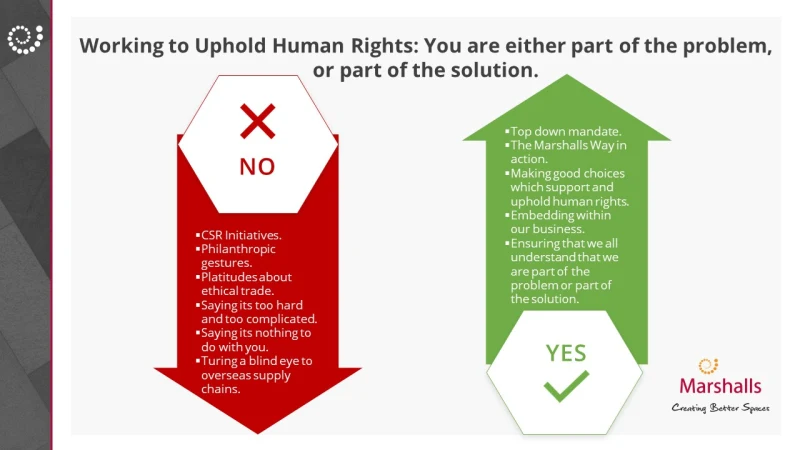We’ve just achieved BRE Ethical Labour Sourcing Standard (ELS) 6002 for the 6th consecutive year. As you’d imagine we’re extremely pleased, but we’re even more delighted that our engagement with BRE ELS 6002 since the very beginning – we were the first in the world to achieve it - has provided us with the solid framework and internal platform to accelerate progress at great speed. The accreditation was developed in response to the UK Modern Slavery Act 2015 and provides the opportunity for organisations to demonstrate their commitment to eliminating modern slavery and human trafficking in their business operations and supply chains.
Our ESG & Human Rights Director, Elaine Mitchel-Hill, makes clear the importance of independent verification, “Third party verification is crucial in this space. It’s not enough to make vague claims within a Modern Slavery Statement, and say that you have processes in place. You need to be able to evidence them. To demonstrate them in action. The independent scrutiny and recommendation by BRE have proved consistent, relentless and ultimately accelerated our own progress. It’s a standards that all in the construction sector should be undertaking.”
Our certification journey mirrors so much about our business and human rights path which started back in 2005. This is the same year that the late Professor John Ruggie was appointed special rapporteur by the UN and began his work which resulted in the Protect, Respect, Remedy Framework and ultimately the UN Guiding Principles for Business & Human Rights.
It’s worth reflecting upon the path that we’ve trodden, especially in the wake of a global pandemic which has exacerbated the vulnerabilities of many already vulnerable people. In addition, the pandemic has presented an increased risk for businesses whose responsibility it is to respect human rights, as well as to comply with legislation and to gear up for incoming mandatory human rights due diligence.
With the benefit of hindsight, and against the trajectory of business and human rights milestones, legal developments, and the introduction of goods sanctions firmly linked to ‘hot goods’ with high risk of child and forced labour, I can now clearly see our own activity in four broad swathes. We began with a naïve period where we were thinking too small and put too much store in our own ability to drive change and to make significant impact and progressed to an adolescent period where we started to grasp the complexities and really began to grapple with what the RESPECT element that Ruggie had brought forth meant in action for us. Beyond this we entered an adult period where we had full vision of the enormity of the task and set about fathoming how we could play our part both in our own business operations, our global supply chain and specifically in relation to the most salient issue of child labour, forced labour, bonded labour and prison labour. And most recently, we progressed into the pandemic period which has most definitively presented us with a tipping point – the mother of all acid test for business and human rights.

“It’s time we all grew up, did our homework and showed up ready to collaborate in new and meaningful ways”
The power of BRE ELS 6002 is continuous improvement; as a tool to push ourselves and continually to raise our game with our human rights work. The rub here for me is that as I look around our own sector, especially in relation to natural stone, what I see is businesses still wandering around in the ‘naïve period’ like cave men. With the reams of information, plethora of learning events and discussion platforms available right now, there is simply no excuse. The pandemic means there is now no time to carve a path in which businesses are thinking too small; the time for that has passed by. There is no time to reinvent the wheel, and besides it is not necessary. This is the collaborative period. It’s time for the sector to dispense with short term, ad-hoc or ineffective projects, philanthropic gestures, and corporate social responsibility initiatives which point to sustainable development goals’ contribution but do not deliver and, worst still, have the potential to cause negative impacts. All of this often infuriates governments in developing countries. The short-termism and lack of joined-up thinking undermines their own efforts to address the issues. It’s time we all grew up, did our homework and showed up ready to collaborate in new and meaningful ways.

I’d urge organisations to engage with BRE ELS 6002, but I’d also expect them to use it to push business and human rights up the internal agenda”
Those already engaged with BRE ELS 6002 will know that you play an active part in setting the objectives for the coming twelve months. Use this privilege to drive improvements within your organisation. Do not do sit back, relax and just go along for the ride.
BRE is categorically not going to share audit evidence publicly, and rightly so, as that’s not the point. But there’s absolutely nothing to stop customers asking certified companies to show what sits behind it. How do they assess risk both in the UK and globally? What are their salient risks and how do they respond? What data do they incorporate, what depth does this go to and how do they build it over time? What are their grievance mechanisms? How do workers in global supply chains whistleblow if all is not well? How do they engage suppliers and what shape does that take in both the UK context and overseas supply chains? Can we see the robust systems in place to work with their supplier base? How does all of this impact internal decision making in support of human rights? Diligent customers will ask to see current and previous Modern Slavery Statements and look for evidence of understanding and analysis of risk, of clear action and steady progress. Yes, this can all be time consuming but it is essential to improving our understanding of the supply chains in which we operate.
With this data at their fingertips, customers will soon see whether those they are working with are informed, diligent and committed, or whether they are ‘thinking too small’; still making philanthropic gestures for photo opportunities; building wells, providing school books and sending shoes, and ultimately being more unhelpful than helpful.
“It’s not easy, and often not comfortable, but we’re all clear here that there is NO carbon off setting equivalent for human rights”
BRE ELS 6002 can essentially be as easy or as hard as you wish to make it. At Marshalls, we have opted to engage with the accreditation to drive our continual improvement, to deliver back on our modern slavery statement KPIs and commitments, and essentially to harness its power. It’s not easy, and often not comfortable, but we’re all clear here that there is NO carbon off setting equivalent for human rights. Just like the bull in the china shop, ‘you break it, you own it’.
In light of all of the developments regarding mandatory human rights due diligence I would imagine that BRE will seek to enhance its accreditation criteria. The entry level requirements will draw in laggards, which is good for the sector. But enlightened companies will work with it as we already do, to further our business and human rights mission; building better futures for everyone.
“We can offer knowledge, insights and detail which will inspire confidence and trust, the kind upon which long term customer partnerships are built”
And finally from me - existing and potential customers, please get in touch so that we can tell you about the high risk supply chain mapping that we’re doing on a global big data platform which gives the context and detail behind modern slavery and human trafficking. Or come and talk to us about the detail behind our risk profiling for sourcing countries, or our live monitoring system in global supply chains, and so many other things. We’d be delighted to share what we know. We recognise that customers are already increasing scrutiny of their own supply chains in the construction sector, which is firmly identified as high risk. The UK Government’s own modern slavery statement has a specific focus upon construction, and you’ll likely know that government spend on construction accounts for pretty much a quarter of all contracts, by all accounts £22bl in 2019. So the heat is on. We can offer knowledge, insights and detail which will inspire confidence and trust, the kind upon which long term partnerships are built. I look forward to speaking with you soon.



